This film stars Shammi Kapoor.
If you like Shammi Kapoor, do not watch this film. If you are a glutton for punishment and want to see it anyway, do not watch the last ten minutes. I can guarantee that you’ll be happier for it; you can decide for yourself what you would have liked the end to be, and spare yourself the trauma of sitting through what is definitely the most horrifying end I’ve ever seen in a Hindi film.
Not that Shama Parwana itself is a bad film, at least not overall and at least not till the last few minutes. It’s a little slow-moving, true. The dialogue is largely high-flown, poetic and thoroughly unrealistic. There are also 12 songs in the film, which (considering that each song takes up at least 3 or 4 minutes) means that well over half an hour of the film consists of singing. Not that the songs are bad—in fact, most of them are excellent—but there’s too much song, too little story.
The story goes somewhat like this.
A young noblewoman, Aalam Meherbano ‘Hijaab’ (Suraiya) is a renowned poetess who sometimes organises mushairas. At one such do, she is highly impressed by a personable young poet, Gul Mirza (Shammi Kapoor). He can’t see her—there’s a flimsy curtain shielding the ladies—but he can well imagine her beauty.
Post the mushaira, a nosey lady-in-waiting, Rehana (Roopmala, who also acted the nosey maid in Aurat), takes it upon herself to convince Meherbano that she, Meherbano, is in love with Gul Mirza. Meherbano denies it hotly; an impoverished poet isn’t the sort of man she should be falling in love with.
Rehana turns to a friend, a maid named Bindiya (?), to help her in messing with Meherbano’s lovelife. Bindiya goes to Gul Mirza and offers to arrange a rendezvous with Meherbano, an idea he leaps at.
Gul Mirza’s rendezvous with Meherbano runs into rough weather; she is horrified to see him in her garden, and he ends up hiding, with Bindiya’s help, in a cauldron (not the most common of garden accoutrements, I should think, but oh so convenient as a hiding place).
But Gul Mirza gets another chance to meet her. At the mushaira, Meherbano had told him that when he composes more poetry, he must come and read it to her. He does so, and she—behind the curtain, with a few maids in attendance—listens. Gul Mirza’s poetry is so entrancing that all the women close their eyes (which I find a little farfetched) and so miss noticing that one of the lamps nearby has set fire to the curtain separating the women from Gul Mirza. Even Gul Mirza’s eyes are closed. By the time they realise what’s happened, a great big hole has been burnt through and Gul Mirza—eyes now open—can see Meherbano in all her beauty.
Meherbano rushes off and all is pandemonium.
A few days later, an important personage now appears on the scene: Meherbano’s father, Afsar-ud-Daulah (Ulhas), a powerful commander in the army of the Mughal Emperor Jahangir. Afsar-ud-Daulah has returned from a victory in the Deccan, and is bursting with triumph and ego. Gul Mirza, along with his bosom buddy Feroz (Sunder), goes to meet Meherbano’s mentor Arif (?), a wise old man who has a soft spot for Gul Mirza. Arif offers to introduce Gul Mirza to Afsar-ud-Daulah; he’s certain that Afsar-ud-Daulah will bestow high office on Gul Mirza.
At the audience with Afsar-ud-Daulah, the nobleman begins boasting of his skill with a sword. Gul Mirza, never one to keep mum, shoots his mouth off about his own prowess as a swordsman: a good swordsman, he asserts, should be able to cut right through something without letting it fall apart. An annoyed Afsar-ud-Daulah tells him to prove it.
The next day, Gul Mirza arrives, to find a wooden pillar in the room, waiting for him. Three swift slashes, and Gul Mirza leaves the pillar still standing, looking intact…
…though actually in three pieces, which fall apart when our hero pushes them. Wah! What skill! Everybody’s impressed, and Afsar-ud-Daulah appoints Gul Mirza a risaldar, a cavalry commander with a mansab of 5,000 sawar. Gul Mirza looks to be upwardly mobile, and he hopes that with his imminent prosperity, he’ll be able to press his suit more effectively with Meherbano.
He soon gets a chance to do so: Rehana arranges another meeting with Meherbano (by giving Meherbano a cock and bull story about a certain type of incense which when burnt can summon the spirit of one’s beloved). When Gul Mirza arrives in her garden, Meherbano believes it’s his spirit, and sings happily with him:
Until better sense prevails. When she realises that this is Gul Mirza and not some spirit, Meherbano gets mad at both Rehana and Gul Mirza. She scolds Rehana, and tells Gul Mirza not to attempt to see her again. Later, she even sends a note telling him to stay away.
A sudden military emergency now arises in faraway Kandahar, and Afsar-ud-Daulah receives orders from Jahangir to send a contingent. It’s a suicidal mission; there is little hope of survival, but Gul Mirza—in true ‘brave hero fashion’—volunteers and goes off, taking with him a carrier pigeon that Rehana gives him from Meherbano. Meherbano sings a mournful farewell song as Gul Mirza rides off. Why can’t this woman make up her mind?!
The next Meherbano knows, the bloodstained carrier pigeon flies back to her, and messengers arrive to tell her father the news: Gul Mirza has been killed! Afsar-ud-Daulah sends two ladies of the court to console Gul Mirza’s mother (?) and to assure her of Afsar-ud-Daulah’s promise that Gul Mirza’s pension will be given to her.
Meanwhile, Afsar-ud-Daulah has been cursing Gul Mirza. He has discovered Meherbano’s long-ago note telling Gul Mirza not to meet her again (Gul Mirza had accidentally dropped the note at his last meeting with his boss). Afsar-ud-Daulah has realised that Meherbano’s interest in Gul Mirza had reached dangerous levels. The only way to rid Meherbano of this silly infatuation—even if the object of her affections is now dead—is to get her married off. So he begins pelting her with proposals from various eligible noblemen.
Eventually, Meherbano, still pining for Gul Mirza (whom she was never affectionate towards while he lived), becomes so dull and listless that the physician recommends that she be taken away for a while to more salubrious climes.
If you do want to see this film through to the bitter end, this is where you should stop reading this review, because I’m actually going to write what happens. Major spoilers follow.
Spoiler ahead:
Meherbano’s trip out of town proves very healing, because who should she meet coming her way but Gul Mirza himself! No, not a ghost, but the man. It turns out that he was badly injured and left for dead on the battlefield, but rescued by some gypsies (who, by the way, may be rebels). Much happy romancing follows, though this being Mughal India in a 1954 film, it’s all very chaste and long-distance: most of the time, Meherbano and Gul Mirza sing joyous songs, she in her chambers and he (with assorted pals!) in his.
None of this goes down well with Afsar-ud-Daulah. Outwardly, he pretends he’s pleased Gul Mirza is back from the dead; on the other hand, he plots with an enemy of Gul Mirza’s and tries to have the young risaldar murdered one night. Gul Mirza gets the better of his attacker, and kills him instead. The result of this is that Afsar-ud-Daulah accuses Gul Mirza of joining the rebel gypsies. He brands Gul Mirza a traitor, and when Gul Mirza disappears from his own home, Afsar-ud-Daulah announces a reward of 1,000 asharfis for anyone who will help arrest Gul Mirza.
Much happens: Gul Mirza, disguised as a sufi, goes to meet Meherbano’s mentor and tutor, the old man Arif, who advises him to tread cautiously. Gul Mirza is however far from cautious: he meets (still disguised as a sufi) Meherbano at a dargah one Thursday, and then one evening sneaks into her balcony to talk to her. Meherbano is initially flustered and jumpy, but then calms down enough to chat with him. Their chatting goes on late into the night and before they know it, they’ve fallen asleep.
They wake up the next morning, and Meherbano’s in a panic, wondering what people will think when Gul Mirza is found creeping out of her room at this hour. Worse, Rehana arrives, to tell Meherbano that her father Afsar-ud-Daulah is coming. Meherbano and Gul Mirza rush out into the garden and Meherbano tries to persuade him to get into that cauldron again. He dillies-dallies: he won’t hide like a coward.
But Meherbano is terrified of what will happen if her father finds Gul Mirza here; so she sings O parwaane, shama ko apni ruswa na karna (“O moth, do not let your flame be disgraced”), and Gul Mirza obediently climbs into the cauldron.
Afsar-ud-Daulah arrives in the garden and (helped by one of Meherbano’s traitorous ladies in waiting) realises that Gul Mirza is in the cooking pot. He doesn’t say so to Meherbano; instead, he asks her why the cauldron is there, and when she says it’s to heat water for her bath, he asks why a fire hasn’t been lit under it. Meherbano can think up no fitting reason, and her father calls for the fire to be lit.
At this point, I’m waiting for Meherbano to suddenly show that she is, after all, a true lover: a woman of strong character who will stand up for her love. And guess what she does? This stupid, selfish, cowardly, lowdown moron of a woman goes down on her knees and starts singing, begging (in metaphor, of course, since Daddy’s standing right behind her) Gul Mirza to stay in the cauldron, because if he emerges from it, Meherbano’s reputation will suffer.
And Gul Mirza stays in the cauldron. The End.
What I didn’t like about this film: (Yes, I’m turning the usual layout of my blog posts on its head; I am so utterly disgusted with this film, I need to vent my spleen!)
What the—?! I know I’ve read this story—the bit about the lover in the cauldron, who is boiled alive by another man (I think a cuckolded husband, in the original version)—but where, I don’t remember; it may be a folktale or something. (The film’s credits say the story’s been inspired by a Mughal legend). But I do remember that the story was more impersonal: the man who was killed in that gruesome fashion wasn’t a hero whom one had come to like and sympathise with in the course of the story. I would have settled for Gul Mirza being killed on the battlefield. But so ignominiously and so horribly? Ugh.
Spoiler ends.
Meherbano. This woman was irritating from pretty early on in the film. She’s wishy-washy and weak-kneed and can’t make up her mind. Worst of all, she strikes me as being unbearably selfish; for her, her so-called respectability is the most important thing in life; she’s willing to sacrifice everything for that. And the end put the lid on it all. I have rarely hated with so much vengeance a character who was supposed to be a hero or heroine. Awful.
What I liked about this film:
The music, by Husnlal Bhagatram. There are some lovely songs here, none of which I remember having heard before. And one, at least, seems to have inspired other composers too!

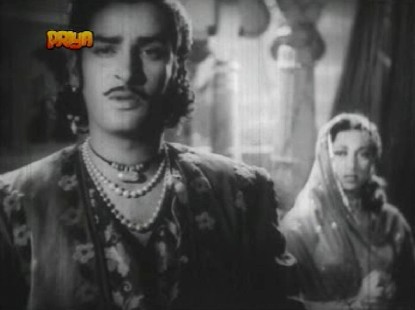

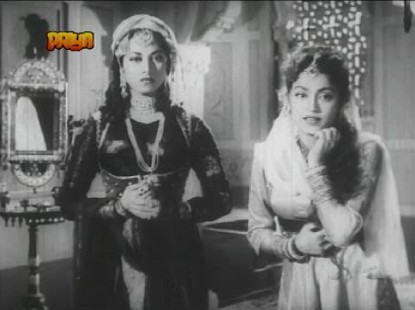




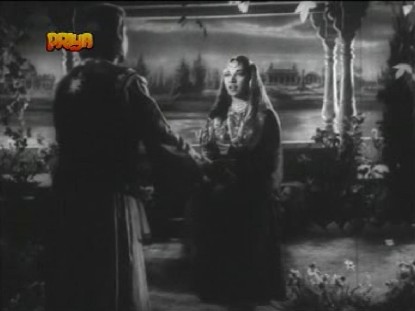



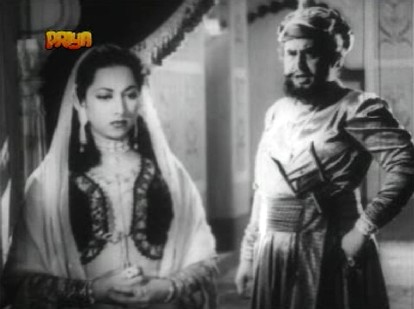
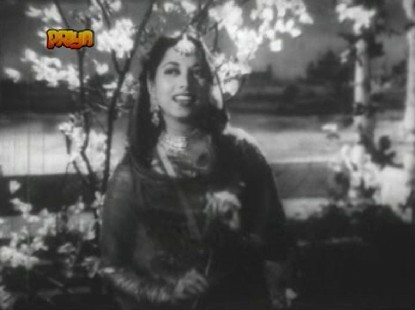
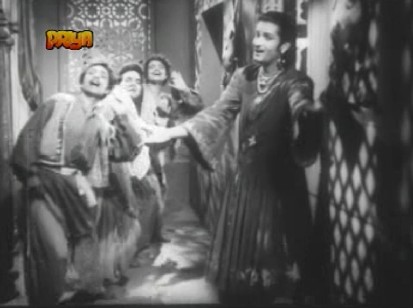

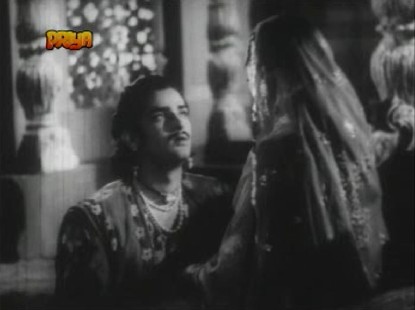
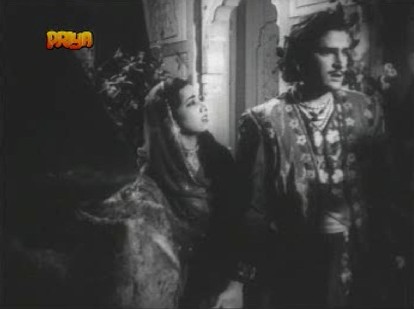

and after he is cooked, do the father-daughter duo dig in? am just imagining a halloween-style scenario. eugh :) ive had this movie a while, and not bothered seeing- maybe not for another now.
LikeLike
Ewww… that would be even more gross! But considering that she’d said this was supposed to be bathwater, maybe she got soap out of him. Yuck, yuck, yuck!
Don’t watch.
LikeLike
Gruesome! The story before the horrid end was still not bad, but I can’t believe they actually made a film like this. And I wonder if it was a hit!
LikeLike
I wouldn’t think it was a hit. Shammi Kapoor’s first hit film, as far as I’m aware, was Tumsa Nahin Dekha. As you point out, this one wouldn’t have been bad if it hadn’t been for that last ten minutes, which made me see red!
LikeLike
Urgh indeed! Memsaab wrote this up a while ago, and since then I’ve known that I must steer clear of this particular set of Shama-Parwana. Stewed Shammi is not for me.
LikeLike
Oh, how did I miss Greta’s review? I wish I’d read that; I’d never have seen Shama Parwana if I’d known how this was going to end. Horrid!! One doesn’t mind villains coming to a gory end, but heroes? No, not thus at least. One can live with a hero who dies sword in hand but one who’s boiled to death isn’t my cup of tea.
Ugh, that’s a bad pun.
LikeLike
I never actually wrote it up except here: http://memsaabstory.wordpress.com/2008/04/20/trivia-time-18/
I was totally disgusted by BOTH of the main characters in this film. Agree completely on Suraiya’s character, and Shammi was just such a dishrag as well. Massive eye roll. But I did really like the songs a lot :)
LikeLike
I did a thorough search of your blog when people said you’d written it up, and I did find your trivia post! Oh, how I wish I’d seen that long ago (God knows how I missed it) – I’d never have seen this film if I’d read that earlier. The songs were fabulous, but with two lead characters who were so wimpy or so selfish, it just didn’t work for me. Not to mention the end.
LikeLike
It’s good you did so that your review can serve as a warning to others :D
LikeLike
:D
LikeLike
the mughal legend involves a daughter of aurangzeb named zebunnisa. she was a poet of substantial repute with nom de plume “makhfi”. one of her lovers was killed in the same manner on the orders of aurangzeb.
LikeLike
Thank you! I didn’t know about that. Must do some research into Zebunissa. The only daughter of Aurangzeb’s that I know of was Zeenat Mahal, the woman who got the Zeenat ul Masajid built in Delhi. I knew there were all sorts of unsavoury rumours floating about regarding the repressed princesses of the Mughal families, so there just may be some grain of truth behind this!
LikeLike
As always, you have written a very interesting review. Also thanks for the link to “Cineplot” it looks like a very interesting site.
LikeLike
Thank you, kenjn60. And yes, cineplot sounds good – I explored a few pages, and there was a lot there that was interesting plus not too well known. I must spend more time on that (plus I must try to find that Egyptian movie!)
LikeLike
Ahh, i feel your pain i just saw a movie yesterday ‘Souten Ki beti’ with Rekha, Jaya Prada and Jeetendra last night, that made me boil on the insides, i don’t even know if i’ll bother writing it up.
LikeLike
I’ve just been checking out the Souten ki Beti page on imdb, and just the look of it put me off – mostly, of course, because I’m not a fan of the sort of films Jeetendra did in the 80’s. Bad, huh? Poor you! Watch something like Parichay or Khushboo soon. :-)
LikeLike
His very first encounter with the cauldron rang a bell for me. Maybe becuase I had read the review at gretas and alo somewhere I’d read the mughal princess story as well.
Totally unsavoury ending, I agree!
The urdu/persian love stories are always full of this, aren’t they? I mean the ‘protecting the honour of the lady love’ stuff.
My uncle had a similar cauldron to heat water for bath, but even as children we never entered it! Though, some snakes did think it was a good idea!
LikeLike
Snakes in the bathwater cauldron must have been dangerous! But that is interesting – I’ve never come across anybody who actually had a cauldron to heat their bathwater. I don’t suppose it was really large enough to accommodate an adult, right?
LikeLike
Thank god the snakes fell in or crept in when no water was inside. But it happened at least once or twice a year.
The cauldron was not big enough to accomodate a sitting adult, but if he/she laid down in foetal position, one could easily hide in there. It was about the size in the screen cap above!
I’ll try it out when I’m in Mangalore again.
LikeLike
Wow! That’s quite amazing! If it’s that huge, it must have required quite a lot of muscle power to empty it into buckets or whatever!
LikeLike
Are you serious??? Shammi Kapoor boiled to death!!!!!! Aaarrrrggghhhh…I’m super angry! What a bad bad bad end!! Yes, I read it and thansk you for the spoiler. For, I will make sure never never never to watch it :(
LikeLike
It was sickening. So absolutely AWFUL. :-(
LikeLike
It’s not that I can’t deal with Shammi in a tragic role – I was fine with Laila Majnu – but oh, how I hated “Shama Parwana”!:-( I’ve never been able to warm up to Suraiyya as an actress and it’s largely because of her role and performance in this movie – she was just UGH. There was nothing redeeming about this film as far as I am concerned- not even the music. :-(
LikeLike
Yes, the tragic role I can bear; it’s the sheer pointless gruesomeness of this that put me off! Nauseating. I’m not much of a Suraiya fan either (though I adore her ghazals in Mirza Ghalib), but her character in this was so spineless and selfish that it nearly cancelled out all the good karma she’d earned with me through Mirza Ghalib!
The only silver lining was that I hadn’t bought this VCD, just rented it. Yippee for that!
LikeLike
I only saw two Shammi Kapoor films in a cinema hall, Bhramachari and Andaz, like him in both. I saw a few of his films on television. I found him okay in films like Junglee, Dil Deke Dekho but found him too fat. But I definitely cannot relate to Shammi Kapoor sporting a moustache so I avoid these films of Shammi Kapoor. Do not know whether you agree with me.
LikeLike
I must admit to preferring Shammi Kapoor – vastly – without his moustache! I like him a lot in his earlier films like Tumsa Nahin Dekha, Dil Deke Dekho, Junglee and Professor: so handsome, and with so much life. He had a certain panache about him that’s very hard to equal, and nearly all his films were very entertaining (and had superb music). He’s actually one of those actors for whom I’ll see a film. But yes, I don’t much like the films at either end of his career: early 50’s, when he had a moustache and often looked gauche, and past late 60’s, when he’d put on too much weight. Between Tumsa Nahin Dekha and Teesri Manzil, though, he’s sublime! :-)
LikeLike
I am not a big mouche fan, but in my humble opinion, I prefer Shammi mith his moustache. He looks quite dashing here!
LikeLike
Yes, he looks quite debonair in that screencap where he’s riding off to war, for example… but I still prefer Shammi cleanshaven. In Ehsaan tera hoga mujhpar… or all through Dil Deke Dekho or Junglee or Professor. Mmmmm :-))
LikeLike
I too was a bit shocked and disappointed with the ending. However, one has to see the ending from a different angle. The reasons why it ended like that were explained in the movie.
For Gul Mirza:
1) There was no way out from the palace.
2) He broke his own sword because he did not want to take anyone’s life and was willing ready to die by the soldiers looking for him.
For Meherbano:
1) Her honour was most important, during her life and also after her death when she dies from the dishonour of people knowing and spreading stories that a man was found in her bedroom.
2) She convinced Gul Mirza to hide in the urn until hos path to escape is clear.
So far so good.
However, when fire was lit under the urn, she sang in order to send Gul Mirza the message of what she wanted to say. It was the only way to communicate to him.
Now from points (1) and (2) above, Gul Mirza had no way to escape, did not want to fight his way out and was willing to sacrifice his life. He could do all of those by also keeping the words of her beloved too, So he remained hidden in the urn and boiled away.
One thing that was missing from the review on this page was that Merehbano actually died in the end too as she fell to the floor. This is obvious from the words she is singing as she falls to the ground. She was singing “O moth, even I will join you, wait for me…” as she breaths her last.
So she actually wanted Gul Mirza to die at this stage so that she could die and join him in the next life, all without losing one another’s honour, something which has no value in today’s societies!
The ending of the movie actually symbolises a candle (Shamma – Meherbano) and a moth (Parwana – Gul Mirza). You can see how a moth is attracted to the flame of a candle in extreme love for it and burns itself to death, and then the flame slowly eats away it’s own candle wax and dies too.
But I agree, the moth and candle story could have been symbolised in a better way than what was depicted in this bad movie.
LikeLike
Hmmm… that’s an interesting (and logical) take on the shama-parwana story. Yes, I agree that makes sense, but frankly, I’m so used to seeing Shammi Kapoor in movies that end happily (even his pre-‘glory days’ movies!) that it was hard to come to terms with a movie where he dies such an ignominious death. Boiled in a pot. Oh dear.
I didn’t realise she actually died in the film. I do remember her falling, but didn’t notice she copped it. In any case, even a tragic end to a romance could’ve been more tastefully done – this was just so terribly disappointing. And sort of humiliating, I thought, for a character like the one Shammi Kapoor played. Even if he had to die, he should have died in a ‘better’ way – on the battlefield, perhaps?
LikeLike
Film story-line don’t work on logic. It is not a judge and jury trial,
which if you don’t like then have option to seek justice from
higher court. In films lot of things can be stated with implied
references and visuals of other artists and objects.
SHAMA PARWANA is and will remain, as the one having the
most idiotic ending. As if turning hero in to ‘Shorba’ (ie: soup
in English) was not enough, the heroine had to sing a 3 -4
minute long song to put a headstone to this awful event
The film most probably was a flop and entire blame can be put
on it’s director’s (D D KASYAP) shoulders.
However, the music was a big hit. HMV issued an LP (soundtrack
version) in late 70’s. It had all the songs, but certainly not all
the poetry and verses. I like following 3 songs the most
Tune Mera Yaar Na MIlaya / Rafi
Mera Dildar Na Milaya (same tune as above / Suraiya
O Jaike Lage Naina, Woh Paye Nahin Chaina
(Suraiya, Asha, ? Male Singer – small ‘alaap’ + Chorus)
– very nice picturization
Sudhir
July 2015
p.s.: Yes, I threw the VHS tape of this film
LikeLike
“SHAMA PARWANA is and will remain, as the one having the
most idiotic ending. As if turning hero in to ‘Shorba’ (ie: soup
in English) was not enough, the heroine had to sing a 3 -4
minute long song to put a headstone to this awful event”
Hehe.. :-) Very well put! I have seen lots of films with tragic endings, even both the hero and heroine dying in the end, but this was such an ignominious end! Really, even if it was based on a supposedly true story, it could still have been softened somewhat – especially considering the massive changes Hindi cinema does make when it comes to historicals.
But yes, the music is excellent. One saving grace.
LikeLike
Hey folks I’m a great fan of both Suraiya and Shammi K. I liked Zed’s view on it. When I saw the movie for the first time 3/3/12 I could not sleep at night thinking Shammi boiled alive in the urn, I was restless and saw the end again next day to check if I missed something…No. that was The end. But from her song lines it seems she is going to join him so when she fell on the floor I liked to beleive sort of that she died, and imagining this way gave me some solace (But how is that possible, she was not ready with poison on her ring?) and poor hero did burn alive ahh!!! I felt disgusted. It is so inhuman but don’t forget muslim rulers were stone hearted when it came about Love without their permission (in the stories, I mean that we’ve read, the hero has to die, often killed brutally) they could kill their daughters in a sec. My heart is heavy..
Ahhhh!!!
Now the good points: It’s a beautiful movie, H. L. Bhagatram’s music is like a fresh breeze, the mushaira, the songs kept me quite captivated (‘coz I love urdu poetry aka “shairy”, the lilting differnt kind of music once again refreshed me, young thin Shammi K. looks handsome, his dialogue delivery is great (he reminded me so much of his nephew Ranbir, who actually is the son of Shammi’s brother Rishi K., you know that. Suraiya is rarely praised but she was one up ‘coz she sings, she acts, she’s a Tragedy Queen and sadly in real life too she could not marry her actor lover. She is a very dignified lady. I think of her in same line with her contemporaries: Nargis, Meena & Madhubala etc.
LikeLike
Although I agree wholeheartedly about the music being great and Shammi Kapoor looking handsome, I would disagree with some of what you’ve said. Firstly, Suraiya is hardly ‘rarely praised’ – I follow a few other blogs, and special blog posts dedicated to Suraiya and her songs appeared on several other blogs to mark her birthday.
Also, “but don’t forget muslim rulers were stone hearted when it came about Love without their permission (in the stories, I mean that we’ve read, the hero has to die, often killed brutally) they could kill their daughters in a sec.“. Hardly. That is a sweeping generalisation. Mainly because you can’t club all ‘Muslim rulers’ into one. Secondly, because (if you are specifically indicating the Mughals when you mention ‘Muslim rulers’), even then – they too can’t be clubbed together. Some might have appeared more brutal than others, but for many this ‘stoneheartedness’ you mention was a result of politics rather than being hard-hearted.
Okay. Lesson in history over for now.
LikeLike
Oops!! Correction: Ranbir K. is the son of Raj Kapoor’s second son, so yes Ranbir is Raj Ji’s nephew as I said before.
LikeLike
I never watched Shama Parwana and I don’t think I will ever watch it. Because I just discovered he has to get boiled at the end. which is probably the worst ending for a Shammi Kapoor lover.
LikeLike
Yes, it was horrible! Stay away from it.
LikeLike
Hi, I came across your rather interesting take on ‘Shama Parwana’ when I was trying to understand the circumstances behind some very lovely songs this movie had. First, I would like to thank you for outlining the story as wikipedia does not have a page for this film and I was really curious about the story. The second thing- the mughal legend which inspired this movie or rather its rather horrible climax. I believe it is what Shahjehan did to his promiscuous older daughter Jahanara- he once paid a surprise visit to Jahanara’s chambers when she was entertaining one of her lovers and jahanara supposedly hid him in a cauldron. Shahjehan suspected as much and burnt the lover to death on the pretext of ordering Jahanara a bath. This is mentioned in William Dalrymple’s ‘City of Djinns’. Thought you’d like to know. And I quite enjoyef your sense of humor. Great post :)
LikeLike
It’s been a long time since I read City of Djinns, so I’d forgotten Dalyrymple had mentioned that story there, but if I remember correctly, one of the other people commenting on this post (I don’t have the time to read through the comments right now) had mentioned another version of the story, which had Aurangzeb as the one out to stop Jahanara having a bit of fun, ;-)
Coincidentally, just yesterday I was talking to someone who’s an art historian and extremely well-informed about Mughal society, art, etc, and he also mentioned this very episode. Again, attributed to Aurangzeb.
LikeLike
I liked your style of narrating the full story of the movie “Shama Parwana” kindly send me a link where more stories are awailable.
LikeLike
Thank you. You can find a list of my reviews of Hindi films here:
English language films here:
https://madhulikaliddle.com/english/
And films in other languages here:
https://madhulikaliddle.com/other-languages/
LikeLike